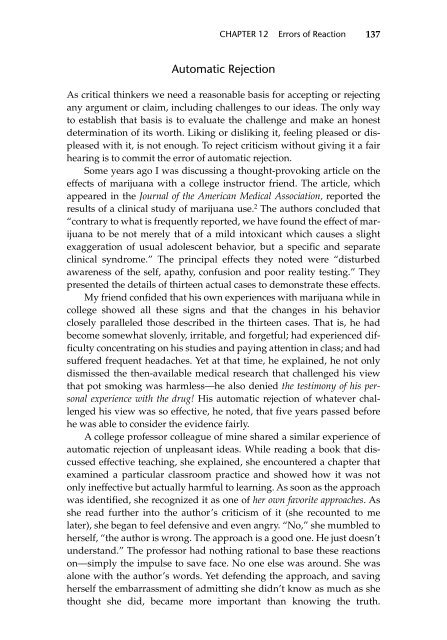Beyond Feelings
Beyond Feelings
Beyond Feelings
You also want an ePaper? Increase the reach of your titles
YUMPU automatically turns print PDFs into web optimized ePapers that Google loves.
CHAPTER 12 Errors of Reaction<br />
Automatic Rejection<br />
137<br />
As critical thinkers we need a reasonable basis for accepting or rejecting<br />
any argument or claim, including challenges to our ideas. The only way<br />
to establish that basis is to evaluate the challenge and make an honest<br />
determination of its worth. Liking or disliking it, feeling pleased or displeased<br />
with it, is not enough. To reject criticism without giving it a fair<br />
hearing is to commit the error of automatic rejection.<br />
Some years ago I was discussing a thought-provoking article on the<br />
effects of marijuana with a college instructor friend. The article, which<br />
appeared in the Journal of the American Medical Association, reported the<br />
results of a clinical study of marijuana use. 2 The authors concluded that<br />
“contrary to what is frequently reported, we have found the effect of marijuana<br />
to be not merely that of a mild intoxicant which causes a slight<br />
exaggeration of usual adolescent behavior, but a specific and separate<br />
clinical syndrome.” The principal effects they noted were “disturbed<br />
awareness of the self, apathy, confusion and poor reality testing.” They<br />
presented the details of thirteen actual cases to demonstrate these effects.<br />
My friend confided that his own experiences with marijuana while in<br />
college showed all these signs and that the changes in his behavior<br />
closely paralleled those described in the thirteen cases. That is, he had<br />
become somewhat slovenly, irritable, and forgetful; had experienced difficulty<br />
concentrating on his studies and paying attention in class; and had<br />
suffered frequent headaches. Yet at that time, he explained, he not only<br />
dismissed the then-available medical research that challenged his view<br />
that pot smoking was harmless—he also denied the testimony of his personal<br />
experience with the drug! His automatic rejection of whatever challenged<br />
his view was so effective, he noted, that five years passed before<br />
he was able to consider the evidence fairly.<br />
A college professor colleague of mine shared a similar experience of<br />
automatic rejection of unpleasant ideas. While reading a book that discussed<br />
effective teaching, she explained, she encountered a chapter that<br />
examined a particular classroom practice and showed how it was not<br />
only ineffective but actually harmful to learning. As soon as the approach<br />
was identified, she recognized it as one of her own favorite approaches. As<br />
she read further into the author’s criticism of it (she recounted to me<br />
later), she began to feel defensive and even angry. “No,” she mumbled to<br />
herself, “the author is wrong. The approach is a good one. He just doesn’t<br />
understand.” The professor had nothing rational to base these reactions<br />
on—simply the impulse to save face. No one else was around. She was<br />
alone with the author’s words. Yet defending the approach, and saving<br />
herself the embarrassment of admitting she didn’t know as much as she<br />
thought she did, became more important than knowing the truth.


